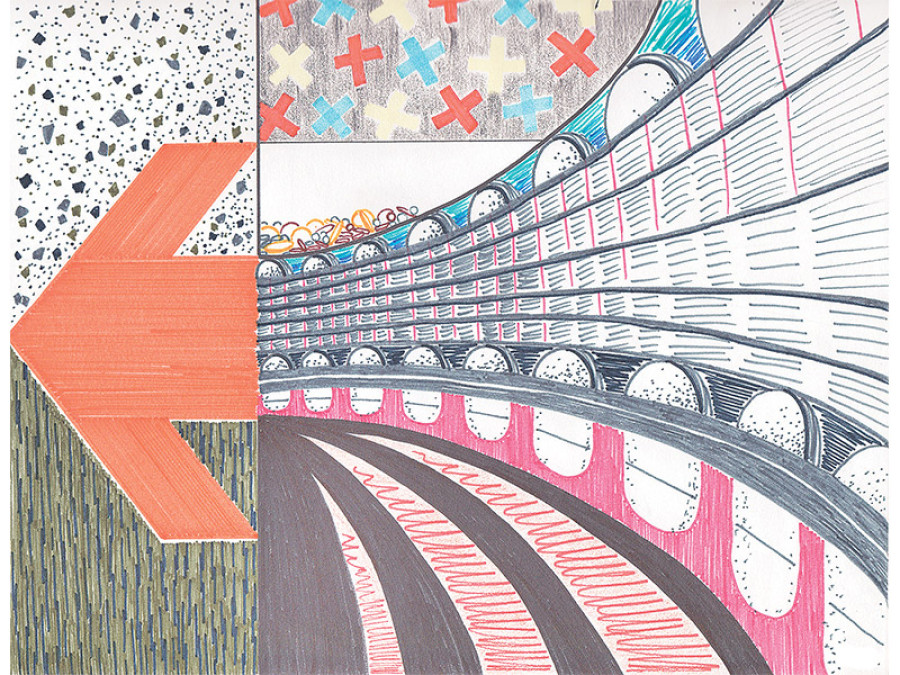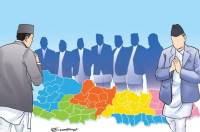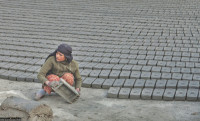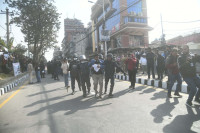Opinion
Passing the buck
Soon enough, the new PM is likely to find daggers pointing at him from all directions
No sooner Khadga Prasad Oli was elected as the 38th Prime Minister of Nepal, he received a personal call from the Indian Prime Minister Narendra Modi. The Indian PM not only congratulated him, but also invited the new prime minister to visit India at his convenience. It was déjà vu all over again. The invitation is superfluous as it has become a ritual for all new PMs in Nepal, immediately after their appointment, to visit either India and/or China.
There is also a sense of déjà vu as the agitating Madhesbadi parties participated in the PM election process. The newly-appointed PM Oli seems to be so jubilant that he is now telling people that ‘the constitutional and legal hurdles’ are over; implying that the actions of the agitating political parties indicates their implicit acceptance of the new constitution. However, others have rebuked this move of the Madhesi parties accusing them of dual moral standards—opposing the constitution and, at the same time, participating in the PM election.
There are two sides to this déjà vu. First, the selection of KP Oli as prime minister and second, the humiliating defeat of outgoing PM Sushil Koirala. This might seem like meaningless repetition of an argument. But KP Oli’s victory cannot be taken as the opposite of Koirala’s defeat and vice-versa.
Koirala’s faults
It is more important to understand the defeat of Koirala than the victory of Oli. Now, it is not just Koirala’s opponents but even his Congress supporters are blaming him for humiliating the party, the country and the people at large. First, Koirala’s action expressed his greed for power. Second, he breached the ‘gentlemen’s agreement’ to transfer power to the CPN-UML after the promulgation of the constitution. Third, his action gave the impression that he was acting as an Indian stooge. And fourth, he is being criticised for his clumsy style of working—inaudible, babbling voice, old age and failing health. He is lucky that he has not been blamed for the devastating April earthquake. During his tenure, the media dubbed him as a clean man riding dirty horses, though he did try to tame a couple of dirty horses from the CPN-UML in his coalition Cabinet.
It would be naïve to write off Koirala from the political history of Nepal. He definitely made a mistake by not informing the public in clear terms about who first breached the gentlemen’s agreement on the enactment of the bill related to the reconstruction authority and the opposition to his move to amend the constitution to accommodate the demands of the Madhesi parties. This could be his public relations failure. His other mistake was miscalculating the number of votes he would get in the prime ministerial election. It was shameful to see three members of the Constituent Assembly being absent during the voting; forget the last-minute betrayal by predator-like opportunistic members. Probably, there is no such thing as permanent friends and foes in politics.
Trouble in Tarai
It would also be naïve to believe that the participation of the Madhesi leaders in the PM election process is tantamount to their acceptance of the constitution. A press release issued moments before the election clearly states that they came to vote as a show of protest “to defeat the unholy alliance between ultra-leftist and anti-democratic fascist characters”. The wording of the press release is pretty harsh and nowhere does it speak of supporting Koirala’s leadership. With Bijaya Kumar Gachhadar now joining the government and the media reporting about a vertical split and disunity among some Madhesi parties, it may be sweet music to some who believe in the concept of divide and rule. But in the end, this does not bode well for the country as a whole. One should remember Laxman Lal Karna’s warning, most probably hinting at the actions of persons like CK Raut: “If the current demands of the Madhesbadis are not fulfilled, no one can stop them from joining a secessionist movement.” This is the single most important reason why the current conflict in the southern plains is far more dangerous than the decade-long Maoist conflict in the mountains. The Maoist conflict was never for a separate state.
More problems
It will be unjustifiable to pass judgement on the Oli-led government as it has just been formed. There is no morning to show the day. Wide rifts can already be observed in inter-party and intra-party power sharing exercises. There is a rumour that he will be supported by, not two, but four deputy prime ministers. Imagine, with so many hungry Maoist and angry monarchist politicians to be accommodated in the Cabinet, ‘Oli-garchy’ will probably give us a larger Cabinet surpassing the records set by Baburam Bhattarai and Sher Bahadur Deuba.
In the days to come, there will be a kind of free-for-all looting of the national coffers. As a blogger has commented, Lok Man Singh Karki of the Commission for the Investigation of Abuse of Authority (CIAA) will be virtually reduced to a joke. He has already been defanged by the appointment of four new members in the CIAA, and his nails have been cut by the new constitution by taking away the power to investigate ‘improper conduct’. Now he can be fired with the recommendation of the Constitutional Council over his ‘physical and mental incapacity to perform’. Physical incapacity is well understood, but how is one going to measure mental incapacity?
Prime Minister Oli has to deal with both ‘Bhadra’ and ‘Abhadra sahamatis’ (the gentleman’s and non-gentleman’s agreements) he signed with his wobbly Cabinet supporters. Soon, he will find himself sitting on a burning pan and daggers pointing at him from all directions. Demagoguery and charlatanism will be of little use to rescue him. In a way, history has rescued Sushil Koirala. His modus operandi may have been slow and clumsy, but his style is, definitely, a la Koirala.




 10.12°C Kathmandu
10.12°C Kathmandu









